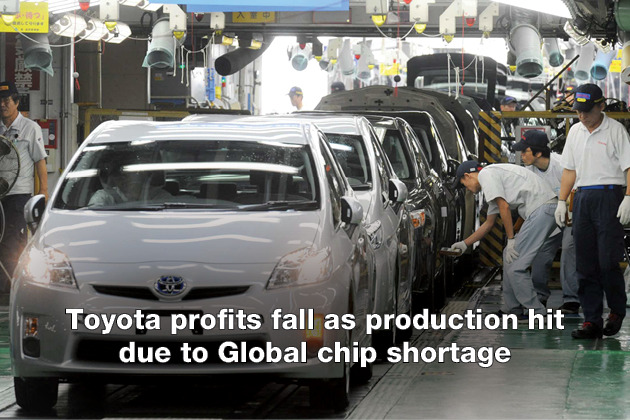Toyota, giant of Japanese motor industry, saw its profits falling by 21% for the last three months of 2021 as the global chip shortage was hitting production.
The company said that the third quarter operating profit came in at 784.4bn yen.
The annual production target was also cut by the world’s best-selling carmaker from 500,000 vehicles to 8.5 million.
It looked as if manufacturers around the world are struggling to find enough microprocessors for their products.
Toyota said in a statement that they sincerely apologise for the inconvenience caused to their customers due to the series of production volume reductions since last summer. They are working to restore full production as soon as possible.
Because of the chip shortage in September, Toyota cut short its worldwide vehicle production by 40%.
The company also announced that as the pandemic hits supply chain, a number of production suspensions was seen in recent months due to a lack of parts.
There was a cut in vehicle production in recent months by rival carmakers including Volkswagen, General Motors, Ford, Nissan, Daimler, BMW and Renault.
Tu Le, managing director of Sino Auto Insights told the BBC that the chip shortage will still weigh on Toyota in 2022 but they will likely manage any challenges better than their peers.
He also added that he thinks they actually see opportunity in crisis because of their confidence in managing the shortages better than GM and VW. So relatively, he sees Toyota having a strong year relative to their competitors.
Toyota cemented its position as the world’s biggest car seller, last month, as it widened its lead over its nearest rival VW.
In January, Toyota warned customers in Japan, separately that they would have to wait for up to four years to take delivery of its new Land Cruiser SUV.
The firm said that the delay was not related to the global chip shortage or the supply chain crisis.
However, the firm refused to comment on the reasons behind the long delivery time.
On August last year, the Land Cruiser, Toyota’s longest-selling vehicle, with a total of 10.6 million, which was launched in 1951 was sold.
The pandemic saw a gush in demand for consumer electronics and medical devices, which all contain computer chips.
This means there was not enough semiconductors left for carmakers.
Earlier, last year, when the global chip shortage first hit the motor industry, Toyota was relatively well prepared as compared to its rivals.
A decade earlier, it had faced a similar issue in the wake of an earthquake and tsunami.
Back then, chip-making factories were damaged, which clearly resulted in major production disruptions for Toyota and other carmakers.
Toyota reviewed its supply chain and started stockpiling, which meant that it had enough semiconductors to last for months.
But as the pandemic continued, those stocks were running low and now the company expects to miss its global production target.
Analysts predicted that the chip shortage could last until next year.
But there is good news as well. In recent months, there have been major investments in plants specially to manufacture chips for the motor industry. Before the pandemic, it was not seen as a priority.
Chipmakers are now fighting to win customers in the auto sector after the semiconductor shortage highlighted the size of the market, especially as the growing electric vehicle (EV) industry which calls for more advanced technology.
Toyota is trailing many of its rivals after having long-focused on hybrids, when it comes to EV. Along with overcoming the chip shortage, Toyota also needs to match with its rivals in the EV market if it wants to hold on to its title as the world’s best-selling car maker.



